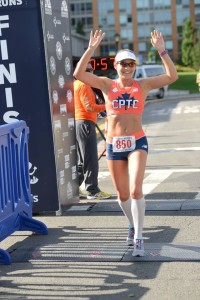 As one calendar year is about to come to a close and we look to the New Year, fitness and health frequently take center stage. This is often a time of reflection on the previous year – races, health, nutrition, happiness, and a time of anticipation and dreams for the future – getting health or weight on track, attempting your first race, working to set new personal race records, trying a new sport, dropping a dress size, sweating on a daily basis, gaining muscle, eating a balanced diet – the dreams and possibilities are endless!
As one calendar year is about to come to a close and we look to the New Year, fitness and health frequently take center stage. This is often a time of reflection on the previous year – races, health, nutrition, happiness, and a time of anticipation and dreams for the future – getting health or weight on track, attempting your first race, working to set new personal race records, trying a new sport, dropping a dress size, sweating on a daily basis, gaining muscle, eating a balanced diet – the dreams and possibilities are endless!
While sorting through your goals, I recommend you do a few things in order to better your odds of succeeding:
- Be honest about your level of dedication/commitment to change – and what kind of change. It may be a million times easier to achieve a 30 minute walk per day for you, than to consume over 10 servings of fruits/veggies per day – for example.
- Be patient, and take your goals one day at a time. You are a human being, so expecting a perfect track record is dooming yourself off the bat. While focusing on each day, do have a clear goal for a few weeks, months or years from now. Each day of success will take you a step closer towards that goal or milestone.
- Ask for help. Very few humans can hold themselves 100% accountable for real change. Rely on a friend, hire a coach/trainer, or use social media or a journal to help your accountability. Meetup groups can also be helpful.
- Change takes time. Don’t expect to see or feel a huge difference within a day or week. However, you’ll be surprised the difference you’ll notice in a month or two!
- Trying something new may not be right for you. Or perhaps what you try won’t be the right fit. Perhaps kickboxing is a better fit than ballroom dancing, for example. We are all different, so don’t feel bad if what you initially try isn’t the right thing! Move on and be fearless in what you try.
- When creating a race goal, be sure to give yourself enough time to be successful! Also be sure any additional races you add to your schedule are supportive of that big goal and not destructive. A big PR in a marathon you flop on your schedule for 12 weeks from now is not wise. Understand your goals the time and work they’ll require.
- Laugh, have fun and get creative with your goals. Not every day will be easy or fun, but I’m a firm believer that we stick to something we like, and that brings positive change to our lives. Life is too short to be unhappy or dissatisfied. See the humor and fun in everything you can!
- Toss out the negative. Recognize triggers, and kick them to a curb. Perhaps it’s your daily mid-morning baked good from the office kitchen, or that friend who guilts you into ditching your run for happy hour each week. Everything is a choice, but you can make those choices easier by breaking bad habits, relationships and influences.
If or when you fall off your goals (remember – you are human!), simply pick yourself back up and try again. Just be sure to not do the same thing and expect a different result. You don’t need a New Year to spring into your goals. Tomorrow is just as good as January 1st.







